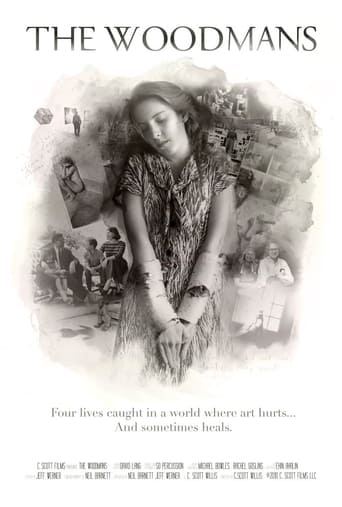drkman_x
Setting aside all of her brilliant and groundbreaking work, I was highly troubled by the detached nature of her parents. They seemed more interested in advancing their own notoriety through their daughter's work. The life of Francesca seemed almost an aside to them.The film itself was worth watching, but I got something entirely different from what I expected. I was left mourning this young woman and gained an understanding of what had her so troubled by seeing her parents casual, almost forced reactions to her death. Her friends were much more upset.Perhaps that was the point. Perhaps they are so devastated by her death that detachment was the only way to cope. I wouldn't say I blame them, but its the way they seem to revel in the attention that had me disgusted.
atlasmb
Though it is a documentary, The Woodmans is itself a piece of art. Like much art, it asks and suggests more questions than it answers. The first question might be: is this a film about art or a film about human psychology? Or maybe it is about how the two are connected?The Woodman family had four members, all of whom are/were dedicated to art, not just as an avocation, but as a way of life. The daughter, Francesca, committed suicide at a young age. Much of the film centers of her surviving family's perceptions of her life, her art, and what might have contributed to her suicide.In the end, each viewer can take what they want from this film. As a discussion of art, it touches on many common themes, especially the value or curse of art as self-expression. Does it have value simply because it allows the artist to express himself? Does affirmation from others make art more valuable? Does it have a therapeutic value? Francesca's mother says she stopped creating for a period after her suicide. When she resumed creating, was it a resumption of life? Or was the creation the impetus to go on living? She says that "art is about memory." Of course it can be much more than that.Of course we must ask if art is about introspection, self-examination, self-indulgence, all of these? It can direct one's focus inward or outward. The father comments on the "fragile" and "vulnerable" nature of the artist. Is that due to the artistic temperament? Or the product of seeking affirmation from others?He also observes that there may be a "psychic risk" of being an artist. This seems to be one of the central themes of the movie. But perhaps Francesca's art (and her behavior) might have been a clue to what many will see as clinical depression. Are some drawn to her art because of her (flawed) vision, like they might be to Van Gogh's?Whatever messages or questions one takes from this film, it does ask you to consider the nature of grieving and carrying on. And it might make one consider others in their own lives who have been or might have been victims of their own internal demons.It also makes a statement about the temporal nature of life and the longevity of art.
Keith Banks
I'm surprised at the low score and negative reviewing of this documentary. Perhaps its a pinch too long but i don't think so. It seems peoples gripe is that there's too much of the family and not enough about Francesca? Um, shes dead. All that we can do is hope her family and friends at the time will communicate, all of whom do. I hadn't heard of Francesca before but somebody recommended it and i thought it was haunting and a beautifully rendered documentary.It is interesting to see the competitiveness within an artistic household, that artists are not above trying to outdo their own family members. It also goes a ways to see why Francesca herself was so obsessively driven for success and recognition. Touching portrait of youth, mostly.
rlchianese
When their avant-guarde artist daughter threw herself out a window to her death at 22, her artist-parents had to reassess their lives. The Woodmans focuses on what Betty and George Woodman do to find expression for their grief and their creativity.Francesca was a photographer in the vein of Diane Arbus and Robert Mapplethorpe, photographing herself in various levels of undress in both dehumanized and sensuous postures. To say she was precocious is to miss the point—like many artist-wunderkinder, she was self-absorbed, schooled very early on by her parents to be an artist. When she kills herself, perhaps out of frustration with her own languishing career, her ceramacist mother and abstract painter father try to move on with their own art. Betty switches to fine art ceramics and her father begins photographing young female nudes! What we soon discover is that the inner dynamic of this family consumed by art may be a deflection from engaging each other at the very personal level. Can art, which tries to engage us emotionally, psychologically and spiritually, distract us from discovering our true inner self and deflect us from self-awareness at the deepest levels?With ample images from Francesca's work and voicing from her videos and from detailed looks at her parents' art and their extensive comments about it, we are left to decide ourselves what was really going on in the hearts and souls and imaginations of these three creative people.
